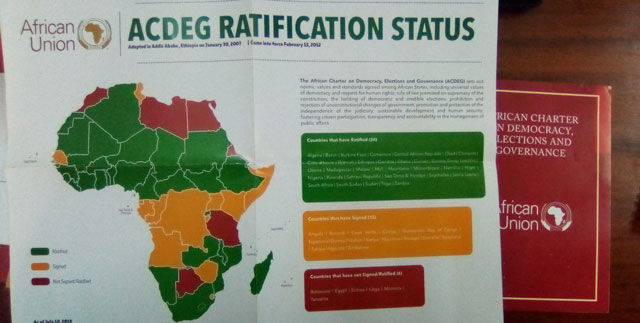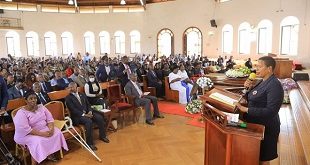
Kampala, Uganda | THE INDEPENDENT | The government is carrying out consultations in a bid to ratify the African Charter on Democracy, Elections and Governance- ACDEG.
Head of Legal Department at the ministry, Ambassador Asaba Amooti says that while Uganda signed the charter in 2008, it has not yet ratified it.
President Yoweri Museveni signed the ACDEG on 16 December 2008, year after it was adopted by the Assembly of Heads of State and Governments of the African Union-AU.
Asaba says that though it is 11 years since President Yoweri Museveni signed the charter, Uganda has not “shelved the charter”.
Asaba explains further that by signing, Uganda expressed interest and good intentions to implement provisions of the charter.
The Ratification of Treaties Act, 1998 provides that all treaties shall be ratified by the Cabinet and Parliament by resolution. Parliament only ratifies treaties that relate to armistice, neutrality or peace or a treaty that the Attorney General has certified that its implementation in Uganda would require an amendment of the constitution.
The minister for foreign affairs is responsible for signing, sealing and depositing the instrument of ratification.
Ratifying a treaty implies that a state by the provisions of the treaty and must conform to it.
Out of the 54 African states, 34 have ratified the charter. They include Ghana, Sudan, Rwanda and South Africa. Uganda, Burundi, Somalia, and Zimbabwe signed but have not ratified it, while 6 states, Tanzania, Egypt, Botswana, Eritrea, Libya and Morocco have not signed or ratified.
Asaba explains that the Ministry of Foreign Affairs is currently consulting with the ministries for finance, justice and potential implementing agencies such as Electoral Commission to ensure that Uganda takes legislative and relevant measures to implement provisions of the charter within Uganda.
The Charter, a regional instrument came into force on 15 February 2012, is based on the AU Constitutive Act, 2000 which provides among others the aspiration to set out continental standards to consolidate democracy and improve governance in Africa.
With 54 articles, some of the key principles of the charter include respect for human rights and democratic principles, holding of regular, transparent, free and fair elections, effective participation of citizens in democratic and development process, rejection of corruption, impunity and unconstitutional changes of government.
The charter also provides for the promotion of gender equality in public and private institutions, transparency and fairness in management of public affairs, strengthening political pluralism and recognizing the role, rights and responsibilities of legally constituted political parties including opposition political parties, which should be given a status under national law.
The Coordinator African Governance Architecture for Uganda, Michael Aboneka has lauded Asaba and the ministry of foreign affairs for commencing consultations, saying that it is a step in the right direction.
Aboneka, however, urges the government to involve and engage the civil society in the consultations.
Aboneka says that by ratifying the charter, Uganda will be obliged to promote good governance, democracy and respect for human rights in Africa.
*****
URN
 The Independent Uganda: You get the Truth we Pay the Price
The Independent Uganda: You get the Truth we Pay the Price


